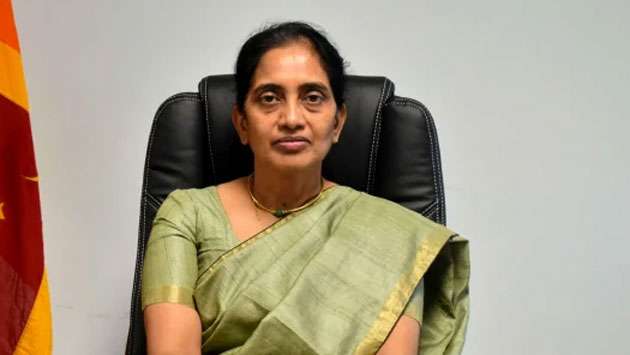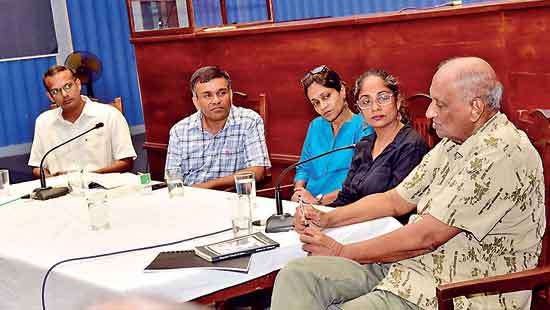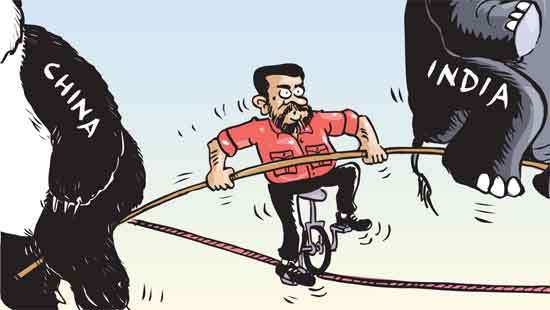Reply To:
Name - Reply Comment


Sri Lanka’s former deputy high commissioner to Australia has been ordered to pay $543,000 in unpaid wages and interest to a domestic worker and now faces a large fine for breaches of employment laws.
Himalee Arunatilaka, who served in Canberra from 2015 to 2018, denied her employee, Priyanka Danaratna, minimum pay and conditions during time in Australia, the court found.
Justice Elizabeth Raper found Ms Danaratna worked from 6am to 10pm, seven days a week and was only allowed two days off in that time after she burnt her hand with cooking oil.
Over the period, she was paid just $11,200 – around 75¢ an hour – which was sent to Sri Lanka. Ms Danaratna also was denied permission to leave the Canberra residence alone, and had her passport confiscated.
In addition to handing down a damning judgment for Ms Arunatilaka, Justice Raper suggested that if the Home Affairs Department had taken a closer look, “Ms Danaratna’s employment may have been very different”.
“It is not without concern that it would have been clear to [Home Affairs], by reason of the materials provided ... that Ms Danaratna was not going to [be] paid nor enjoy the protections under the Award or the FW Act,” she wrote.
“There was no apparent attempt to conceal the arrangement by Ms Arunatilaka. It is perplexing that the department, in the circumstances, did nothing and granted the visa in the circumstances.”
Himalee Arunatilaka currently serves as Sri Lanka’s Permanent Representative to the United Nations (UN) in Geneva.
The case is one of several recent examples where diplomats from countries with poor employment practices have been caught failing to comply with employment laws and have been hit with big penalties in Australia.
The Australian Federal Court last year ordered India’s high commissioner between 2015 and 2016 Navdeep Suri Singh to pay $189,000 in unpaid wages and interest to Seema Shergill, who was found to be working in “slave-like” conditions in the chief diplomat’s residence.
Justice Raper also ordered Mr Suri to pay a $97,200 fine for wage theft, the maximum amount allowed.
Mr Suri brought Seema Shergill to Australia when he started in 2015. When they arrived in Australia, he confiscated Ms Shergill’s passport and confined her to the family’s Canberra residence.
Neither Ms Arunatilaka nor Mr Suri defended the legal actions against them, and it is not clear whether the claimants in either case will ever see a cent of the amounts awarded.
The cases were only possible because the Federal Court recognised that the residual immunity granted former diplomats does not extend to employees in their direct employment, who are covered by Australian fair work laws.
Clayton Utz pro bono Partner David Hillard, who led both matters along with Canberra barrister Prue Bindon, said these were not isolated cases.
“It is the second Federal Court matter in less than a year involving domestic workers at diplomatic residences in Canberra,” Mr Hillard said. “Domestic workers in foreign diplomatic residences are among the most vulnerable and isolated workers in Australia.
“It is hard to conceive of someone in 21st century Australia literally being trapped in a job for three years and earning 75 cents an hour.
“This decision … confirms clearly that these workers have rights in Australia, and that senior diplomats cannot hide behind diplomatic immunity when it comes to keeping their servants under slave-like arrangements.”
Ms Arunatilaka was in 2023 appointed Sri Lanka’s ambassador and permanent representative to the United Nations in Geneva.
Rip Winkle Thursday, 15 August 2024 08:41 PM
"Neither Ms Arunatilaka nor Mr Suri defended the legal actions against them, and it is not clear whether the claimants in either case will ever see a cent of the amounts awarded" The can, with the right legal representation. I certainly wish this poor worker all the best, and hope our diplomutt is relieved of her duties immediately.
4 89
Lk Thursday, 15 August 2024 08:45 PM
Look how our diplomatic mission and its professionals behave… Many people don’t come out to tell the world what is going on in our diplomatic missions.. many higher commission and its higher officials are bullying their staff verbally or otherwise ..but rarely minor staff complain about it for fear of their posts and salaries ..now at least one case come out and many more will come out soon ..: if you want to take all this out vote for NPP to clear all this mess..
14 65
Danny Thursday, 15 August 2024 08:51 PM
Sri Lanka may st lock horns with Australia over this and deny!!
17 12
wsw Friday, 16 August 2024 10:38 AM
That will be an exercise in futility, Australians value and respect fundamental rights of the individual, courts frown upon such abuse with disdain. The Lankan government will end up with egg on their faces challenging such decisions which draw a lot of emotion in society.
0 8
W.Perera Thursday, 15 August 2024 08:59 PM
This is a grave violation, especially as it involves a woman in a position of power committing such an act against a fellow Sri Lankan woman. Sri Lanka must not tolerate this. The government has a responsibility to ensure that those who represent the country on the international stage are held to the highest ethical standards. Failing to address this would not only be a miscarriage of justice but would also undermine Sri Lanka's credibility in defending human rights globally.
0 70
Lanka Thursday, 15 August 2024 09:08 PM
Vote for NPP to clean all this misuse of post and positions.
36 84
Anna Paul Thursday, 15 August 2024 09:09 PM
Sri Lankan diplomats are expected to protect our citizens from exploitation and violence, especially those working as domestic aides in foreign countries. Yet, in this case, the very person meant to be their protector has allegedly violated the basic rights of an innocent and vulnerable woman. Can such a person truly represent Sri Lanka? She should be recalled immediately, and legal action must be taken to hold her accountable. There should be no leniency or special treatment simply because she holds the title of ambassador. Justice must be served for the maid, especially in light of reports suggesting that the ambassador intends to disregard the judgment, hiding behind diplomatic immunity. Such behavior is unacceptable and must be addressed with the seriousness it deserves.
0 60
ASHRAF Ali Thursday, 15 August 2024 09:10 PM
This situation is deeply troubling. A Sri Lankan diplomat, accused of violating the human rights of a vulnerable Sri Lankan woman, should not be representing the country at the UNHRC, where the defense of human rights is paramount. How can a human rights violator speak on behalf of our country and defend the country as there no credibility and should be immediately sacked for spoiling the county”s image and made to stand trial in Sri Lanka.
0 84
Daranagama Friday, 16 August 2024 06:07 AM
Certainly. This shall be initiated immediately, which will serve as a lasting example to everybody!!
0 7
Kumar soysa Thursday, 15 August 2024 09:27 PM
This reflects extremely poorly on our society. The GOSL must prioritize getting to the bottom of this and if this “lady” diplomat (?) is guilty, the line minister must take punitive action. Also ensure such practices are not taken by those who represent this gem of a country. Where’s the tolerance, decency and compassion??!! I’m
0 42
Krishantha perera Thursday, 15 August 2024 09:41 PM
I recall former foreign secretary Ravinath Ariyasinghe now retired, who was stationed in Belgium one time and faced serious allegations of harassing and exploiting his maid. Although the Belgian court ruled against him, he evaded justice by invoking diplomatic immunity. If these are the individuals representing our country, what can we expect? God save Sri Lanka Allowing Arunatilake the human rights abuser to continue as an ambassador in Geneva not only undermines Sri Lanka’s credibility but also sends a dangerous message about the country’s stance on human rights
0 68
Gona Thursday, 15 August 2024 09:41 PM
Rajapakshahora's sweetie.
1 51
Roman Twik Thursday, 15 August 2024 09:43 PM
This is a serious breach of human rights and labor laws, reflecting conduct that is utterly incompatible with her current role as Sri Lanka’s Permanent Representative to the United Nations in Geneva. Ms. Arunatilaka’s actions, which include gross exploitation and mistreatment of a domestic worker, are not only illegal but also deeply unethical. It is inconceivable that someone with such a record could effectively represent Sri Lanka at the UNHRC, an institution dedicated to upholding human rights. This incident tarnishes Sri Lanka's reputation and undermines its credibility on the global stage. Immediate action by the government is necessary. She must pay the full amount awarded to the victim without delay otherwise one day government will be liable to pay and she be recalled from her position in Geneva Allowing her to remain in this role would be a grave misstep, as it sends the wrong message about Sri Lanka's commitment to human rights the whole ambassador being the biggest human
0 43
Smh Thursday, 15 August 2024 10:15 PM
She's now in a UN Permanent Representative in Geneva. So now the UN can garnish her wages and make this loser and low life abuser pay the judgment to her former victim/employee.
1 45
Karalasingam Sivalingam Thursday, 15 August 2024 10:37 PM
Most of the rich affluent families treat domestic servants like slaves, even in Sri Lanka, there are (not all) diplomats, politicians, high officials, Colombo 7, elite, business men, treat servants in similar manner, but they show a pleasing face to the public, many domestic servants live similar to " a dream of a dumb" , every police station must have road side letter boxes to drop complaints anonymously for investigations, to stop slavery, discrimination, harresment meted out to domestic worlers.
0 42
Hassanda Thursday, 15 August 2024 10:52 PM
Like the Rulers in Sri.Lanka - same way SL diplomats Are behaving nothing new - This Diplomat ( Ms Arunathilaka ) shud be Relieved of duty and sent back to SL and MFA Shud conduct a disciplinary hearing for mistreated Her employee
1 39
Buddhist Thursday, 15 August 2024 11:12 PM
Will Ranil also ensure that employers in Arab countries are requested to pay such payments and penalties to our domestic workers?
8 16
wsw Friday, 16 August 2024 10:50 AM
Meaningless comment, Ranil W holds no authority over foreign jurisdictions for potential violations. However, in this instance please note Arunathileke is a government representative and is naturally expected to behave in an exemplary manner not abusive. If the government would like to go down the path of challenging an Australian court ruling, it's their prerogative but every move will be monitored and reflected back on our country. In the meantime, she is expected to stand down from her current position without dragging the nation to further disrepute.
0 3
Gabriella Thursday, 15 August 2024 11:23 PM
This is Sri Lankan culture publicly manifest. The mistreatment of people below one's station as a demonstration of power and success. It is the exploitation of the downtrodden, the subjugation of the powerless, the public humiliation and mistreatment of service staff in the mistaken belief that this sort of conduct publicly progects the self importance of an individual.
0 27
wsw Friday, 16 August 2024 10:53 AM
Not fair to generalise, every society has a few rotten eggs, we have to simply deal with it and rectify.
1 0
Tissa Fernando Thursday, 15 August 2024 11:28 PM
A lesson to learn from this, never hire a Sri Lankan domestic servant from Sri Lanka and bring her into the country where you work . Hire someone who is already there. This way you can avoid getting into trouble.
22 15
Tissa Fernando Friday, 16 August 2024 03:22 AM
No, the person uses the opportunity as a stepping stone to fet into the foreign country and no matter what you pay them , they are always trying to leave your place. By getting a professional domestic service you can avoid all the trouble and you can get a good service too.
2 6
Ruwan Jayawardene Thursday, 15 August 2024 11:33 PM
It is inconceivable that someone who has engaged in such exploitative practices could be allowed to represent Sri Lanka at the United Nations Human Rights Council in Geneva. Her conduct not only disgraces the position she holds but also severely damages Sri Lanka's reputation on the international stage. She must be immediately recalled from her position. Allowing her to continue would be an affront to the principles of justice and human rights that the UNHRC stands for. Furthermore, with elections approaching, the people of Sri Lanka are closely watching how the current government, particularly the Foreign Minister what action he will Be taking ? The government's actions—or inaction—in this matter will be a clear indicator of its commitment to upholding human rights and justice. It is imperative that the government takes swift and decisive action against this human rights violator. If this has happened in another country by now she / he would have been sacked. God save Sri Lanka
0 28
Puthra kumar Thursday, 15 August 2024 11:50 PM
What respect now this diplomat will have with other missions based in Geneva and the UNHRC ? How can she conduct business on behalf of Sri Lanka.? Before UNHRC and Geneva Govt send her back home it will be better for Government to recall her immediately to protect the name of Sri Lanka . We have a efficient foreign minister who is capable of taking necessary action in theninter st of the country and people of Lanka are watching you Mr Minister
1 31
Damji Paul Thursday, 15 August 2024 11:58 PM
It is our understanding that she served as Ambassador in Nepal, and despite a pending court case against her in Canberra for the exploitation of her maid, the Foreign Ministry callously cross-posted her to Geneva which is unusual. When such cases are filed against our diplomats abroad, it is important that internal inquiries or legal actions are also initiated in Sri Lanka. While they may escape justice under diplomatic immunity abroad, they should not be allowed to evade accountability in Sri Lanka.this will tarnish the name of our country and other countries will undermine Sri Lanka and the foreign ministry.
0 8
Logical Friday, 16 August 2024 12:21 AM
She treated her as if she is in Sri Lanka. Giving the servant Sri Lankan wages and getting the servant to work 16 hours a day.
0 6
Banda Friday, 16 August 2024 02:51 AM
I hope the president and the ministry of foreign affairs will suspend her appointment and call her back. This cannot go unpunished.
0 6
Raymond Friday, 16 August 2024 05:13 AM
It all stems from one basic aspect: Sri Lankans accept and work for meager salaries due to poverty. We encourage our sisters and mothers to go to the Middle East to work for little money. Not only are they robbed of their rightful earnings, but the social fabric is also being destroyed. Does anyone worry about the economy and social consequences? We read in the newspapers about politicians boasting that they have managed to send a record number of people to the Middle East for employment. Most probably, she went to work without realizing that a cup of coffee costs $4.50, while she was paid 75 cents an hour. The country is experiencing a slow decline and is having its resources exploited by powerful countries.
0 4
AJ Friday, 16 August 2024 06:27 AM
This diplomat herself is eye opening example of human rights violations in SriLanka, Its good for her to reveal her side of the story
0 3
Indunil S Peiris Friday, 16 August 2024 06:35 AM
Foreign Minister over to you for immediate action please, before UN take action.
0 6
Jude Friday, 16 August 2024 06:42 AM
Himalee, you could be a diplomat, but have some class. Am sure himalee claim the money from foreign services and she pocketed money as she claimed that she paid the domestic helper full salary. These women get plum diplomatic posting by extending sexual favors to politicians!!
1 4
Pat Kumatasinghe Friday, 16 August 2024 06:58 AM
Thease are all political appointees, who speak English like “ nott, pott, Charlie’s.
1 4
KT.Raj Friday, 16 August 2024 07:13 AM
Show dignity respect and a living wage to the lower end for the society. All Sri Lankan should dismiss devalue, and disrespect their worth.
0 3
Don Friday, 16 August 2024 08:33 AM
Did she think Australia was a part of Middle East to behave like that? If this is the behaviour of educated person, there is no hope to expect anything from an uneducated person? Please recall this lady from Geneva before UNHRC make a note in their reports that SL government made n attempt to condemn this act and took necessary actions.
0 8
Ravi Friday, 16 August 2024 09:09 AM
Common guys. Everybody is playing "holier than thou". More than in the domestic worker industry, commercial shipping companies pay below the minimum wages stipulated by developed countries. Many countries have severe penalties on sailors from their country taking the shipping company to court in developed countries. Sri Lanka does not and hence some shipping companies prefer to recruit for countries which protect the employer. Does anybody think that a sri lankan domestic worker would get a work visa or the salary stipulated by the Australian government? Thinks about it. This is not as simple as it sounds.
1 2
Ram P Friday, 16 August 2024 09:47 AM
It is a Sri Lankan Government employee who committed this misdeed and the SL Foreign Ministry must step in to have the money deducted from the salary of the employee and paid to the creditor former employee
0 2
Gayan Sameera Friday, 16 August 2024 09:52 AM
Ambassdor should be immediately recalled and suspended pending internal investigation as she being the biggest human rights violator cannot head and defend Sri Lanka in Geneva at the UMHRC and spoiling the name of Sri Lanka. Now that the UNHRC session is round the corner coming up next month she should immediately removed from Geneva to avoid more embarrassments to Sri Lanka and wasting our tax payers money
0 7
Yohan Friday, 16 August 2024 10:05 AM
These diplomats have high connection so hardly they will pay. This shows how the asian diplomats are corrupt
0 3
Maithri Weerasinghe Friday, 16 August 2024 11:04 AM
This is a usual common practice of those families who have some little money in Sri Lanka when in abroad. They will work out a visit visa playing all tricks to a known domestic worker and abuse that worker by paying the same salary or slightly above the minimum wage recommend in Sri Lanka. This is what one can call “exploitation of the poor by a wicked witch”.
0 5
another backdoor appointment Friday, 16 August 2024 11:22 AM
These so called overseas diplomats are connected to the Rajapaksa family either the members of the family friends or kith and kin. They are not really qualified to do the job and hardly do anything and enjoy all the perks which comes with the job. if this domestic worker had joined the queue to work in the Middle East as a Sri Lankan housemaid where there is quite a demand she would have earned more money and helped the country's economy which is currently one of the main foreign exchange earner.. Since middle east employment is regulated by the government the same rules should apply in this instance too. According to statistics pre-covid just over two hundred thousand Sri Lankan women were employed in the Middle East as housemaids. Since the cost of living has skyrockted in recent years by leaps and bounds there's quite an influx of sri Lankan women leaving to the middle east to work as housemaids.
0 3
Subash premathilaka Friday, 16 August 2024 11:52 AM
The revelations surrounding Ms. Himalee Arunatilaka's conduct are alarming and demand immediate action. Her actions represent a serious breach of human rights, and it is incomprehensible that someone with such a record could continue to serve as Sri Lanka’s Permanent Representative to the United Nations in Geneva. This situation raises serious questions about the Foreign Ministry’s commitment to upholding human rights and the rule of law. The Foreign Ministry must act decisively to remove her from Geneva not only to preserve Sri Lanka's integrity but also to send a clear message that human rights violators will not be shielded by diplomatic titles. Failing to do so suggests a troubling level of complicity or negligence, which could have severe repercussions for the government’s credibility both domestically and internationally. It is critical that the Foreign Ministry does not attempt to cover up this gross misconduct. The people of Sri Lanka are watching and Me Minister over to you
0 4
Former UN Staff Friday, 16 August 2024 01:39 PM
This is serious matter. GoSL should immediately remove her from the UN position in Geneva to control the damage. It must be very difficult to hear as well dealing with the UN community and also with her subordinates.
0 6
Priyantha Gunasekara Friday, 16 August 2024 02:26 PM
This person should be punished, rather imprisoned for the violation of human rights. Just asking to pay compensation is not sufficient.
0 3
FredSnR Friday, 16 August 2024 02:41 PM
What will be the worth of a Sri Lankan passport after this and how will ME employers treat our maids and workers after they see how we treat them in foreign lands.
0 2
Mohamed Adham Friday, 16 August 2024 03:59 PM
Dont think that she is a career Diplomat. Certainly a political appointee. A full time Career Diplomat would never stoop to this level. These political appointees should be kicked out. During Mynah's period, this practice of appointing political stooges was at its peak.
0 4
Devendra ekanayake Friday, 16 August 2024 04:06 PM
Thank you for daily mirror to bring this story to public. It is unacceptable for someone convicted of such severe human rights violations, including the illegal confiscation of a fellow citizen's passport, to hold a position of diplomatic authority. This conduct tarnishes Sri Lanka's reputation globally. The Foreign Ministry must take immediate action to suspend her. Allowing her to remain in her role, particularly at the United Nations Human Rights Council, is a gross misstep that damages the credibility of our nation and undermines our commitment to justice. As a convict she is unfit to serve as a diplomat in any capacity. Foreign Ministry must ensure that it is not seen as covering up or excusing these serious violations.government's reputation and the trust of the people are at stake. Swift and decisive action is required to restore faith in our diplomatic corps and to demonstrate that Sri Lanka will not tolerate such behavior from its representatives.
0 2
Devendra ekanayake Friday, 16 August 2024 04:06 PM
Thank you for daily mirror to bring this story to public. It is unacceptable for someone convicted of such severe human rights violations, including the illegal confiscation of a fellow citizen's passport, to hold a position of diplomatic authority. This conduct tarnishes Sri Lanka's reputation globally. The Foreign Ministry must take immediate action to suspend her. Allowing her to remain in her role, particularly at the United Nations Human Rights Council, is a gross misstep that damages the credibility of our nation and undermines our commitment to justice. As a convict she is unfit to serve as a diplomat in any capacity. Foreign Ministry must ensure that it is not seen as covering up or excusing these serious violations.government's reputation and the trust of the people are at stake. Swift and decisive action is required to restore faith in our diplomatic corps and to demonstrate that Sri Lanka will not tolerate such behavior from its representatives.
0 3
JP JEY Friday, 16 August 2024 04:21 PM
Isn't it similar to another case in Australia, (2021) where a Sri Lankan couple, Kumuthini and Kandasamy Kannan kept a woman as a slave for eight years in their Melbourne home. JFI, Mr Kannan attended S Thomas , Mount in Colombo, Sri Lanka, ....( I know that, the school attended is not important, its added just for the fun of it)
0 6
Sam Silva Friday, 16 August 2024 05:37 PM
All her bank accounts should be frozen.
0 3
Sinna Friday, 16 August 2024 05:39 PM
This reminding me similar incident occurred in one of then minister’s Colombo 7 home,he used to hire young female girls especially from upcountry area as servants but at his place they were subjected to rape, it was exposed when one of those girls was burnt to death, he still in politics and recently he announced his support to RW
0 7
JD Friday, 16 August 2024 06:35 PM
Sack her from the position and compensate the victim.
0 5
Mandayan Friday, 16 August 2024 07:39 PM
Please check and ensure that the Swiss government is following suit. Old habits die hard.
0 0
DLL Gunasekera Saturday, 17 August 2024 12:23 AM
I am living in Switzerland since 1973 and now Retired .Through my company ( Latley Embassy servises) , almost all embassies/ missions had been my clients and still having very good personal relationships with ex Ambassadors and staff as well. I got to know our head of mission has become a laughing stock among them. Leave behind this domestic affair which I don’t have any clue. But no surprise.
0 2
kalyana jayasinghe Saturday, 17 August 2024 11:21 AM
This is another tragedy in Sri Lanka. Qualified or high rank people are looking forward to give their favor to corrupted politicians for their limitless benefits. our country must be drastically changed.
0 0
Soori Maripalan Tuesday, 20 August 2024 09:00 AM
That is the way of many SL workers and students behave to get VISA! Australia pays sympathy for culprits and this will become a rubbish bin very soon with such lawyers came in using the same tricks as this working lady!
0 0
Rajan V Pillai Saturday, 24 August 2024 05:02 AM
Sri Lankan Diplomatic staff are entitled to take a helper from Sri Lanka to assist the family in domestic matters. Perks given by the Government include this cost. The question is whether the Diplomatic staff paid the allowance allocated to for helpers under their perk. On the other hand some aides go obligingly even relatives of the Diplomat, and quarrel with the employer afterwards to get Permanent Residence or Citizenship in that country. There are lot of risks in taking a worker for a foreign home of a Sri Lankan family. They try to use this route as a easy way of migration. This has happended to lot of Indian Diplomats too.
0 0
Add comment
Comments will be edited (grammar, spelling and slang) and authorized at the discretion of Daily Mirror online. The website also has the right not to publish selected comments.
Reply To:
Name - Reply Comment




















